Parameters: Testing Object: Basic Information:
Scale: 1:20
Water Volume: 80.35 in3
coloring agent: Blue Observation:
Phase 1:
Coloring Agent Diffusion: Fast Phase 2: Wave Break Condition: Easy
Wave Generator: Paddle

Wave Length: 19.0 ‘
Wave Height: 8.0’
Generate Frequency: 1.6 times/s
Generator Location: 0.2 (left to right - 0.0 - 1.0)
1. Null
Basic Information:
Scale: 1:20
Water Volume: 80.35 in3
coloring agent: Blue
Parameters: Testing Object:
Wave Generator: Paddle
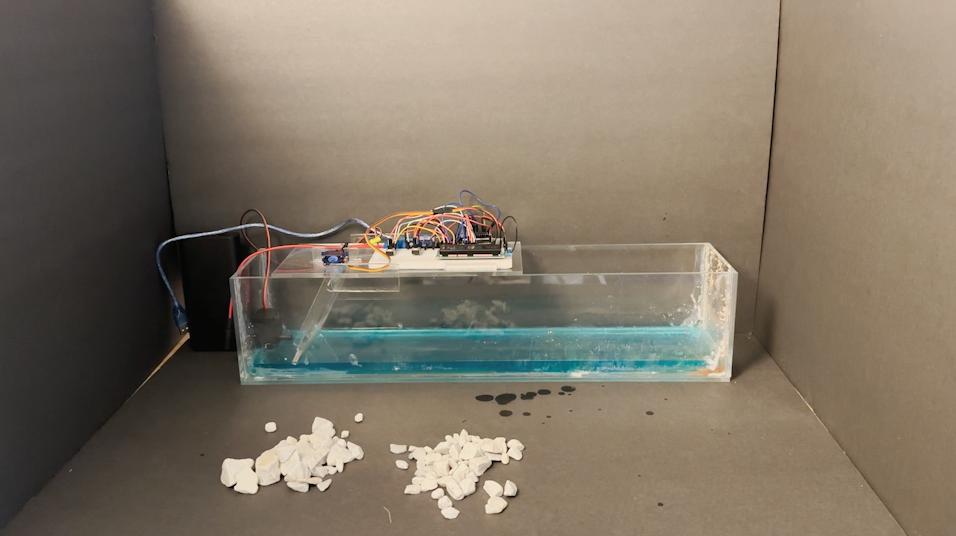
Wave Length: 19.0 ‘
Wave Height: 8.0 ‘
Observation:
Phase 1:
Coloring Agent Diffusion: Fast
Phase 2: Wave Break Condition: Easy
Generate Frequency: 1.6 times/s
Generator Location: 0.2 (left to right - 0.0 - 1.0)
1. Gravel (large size)
2. Gravel (small size)
Basic Information:
Scale: 1:20
Water Volume: 80.35 in3
coloring agent: Blue
Parameters: Testing Object:
Wave Generator: Paddle

Wave Length: 19.0 ‘
Wave Height: 8.0 ‘
Observation:
Phase 1:
Coloring Agent Diffusion: Fast
Phase 2: Wave Break Condition: Easy
Generate Frequency: 1.6 times/s
Generator Location: 0.2 (left to right - 0.0 - 1.0)
1. Gravel (small size)
Phase 3: Object’s Impact on Wave: The reflection from the ending wall of the wave highly reduce. The water surface is much more stable on the right side of the gravel.
Basic Information:
Scale: 1:20
Water Volume: 80.35 in3
coloring agent: Blue
Parameters: Testing Object:
Wave Generator: Paddle
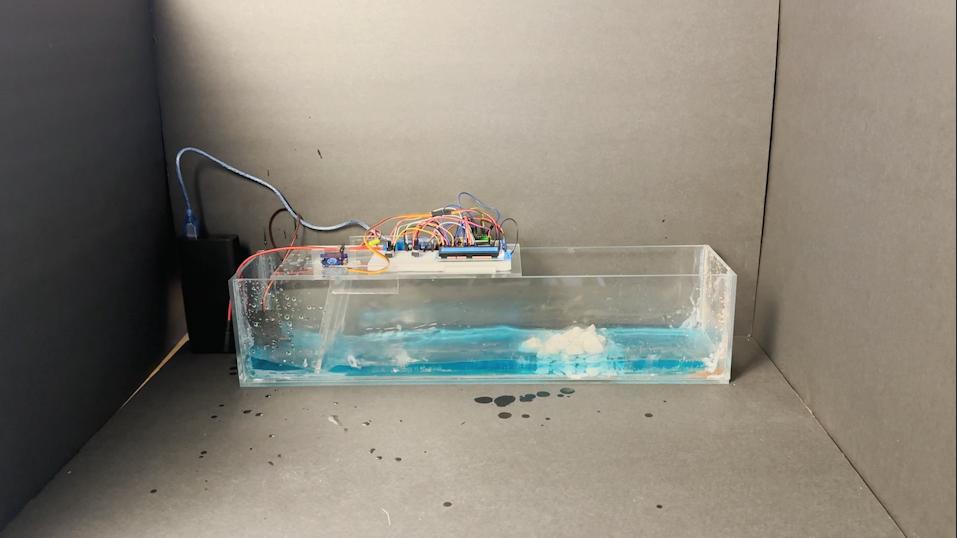
Wave Length: 19.0 ‘
Wave Height: 8.0 ‘
Generate Frequency: 1.6 times/s
Generator Location: 0.2 (left to right - 0.0 - 1.0)
1. Gravel (small size)
Observation:
Phase 1:
Coloring Agent Diffusion: Fast
Phase 2: Wave Break Condition: Easy
Phase 3: Object’s Impact on Wave: The reflection from the ending wall of the wave highly reduce. The water surface is much more stable on the right side of the gravel.
Phase 4:
Object’s Impact on Wave: Bigger size gravel sitting on top could effectively eliminate wave peaks. But the wave turns to naturally drop down before hitting the bigger size gravel facade.
Basic Information:
Scale: 1:20
Water Volume: 80.35 in3 => 120.21 in3
coloring agent: Blue
Parameters: Testing Object:
Wave Generator: Paddle
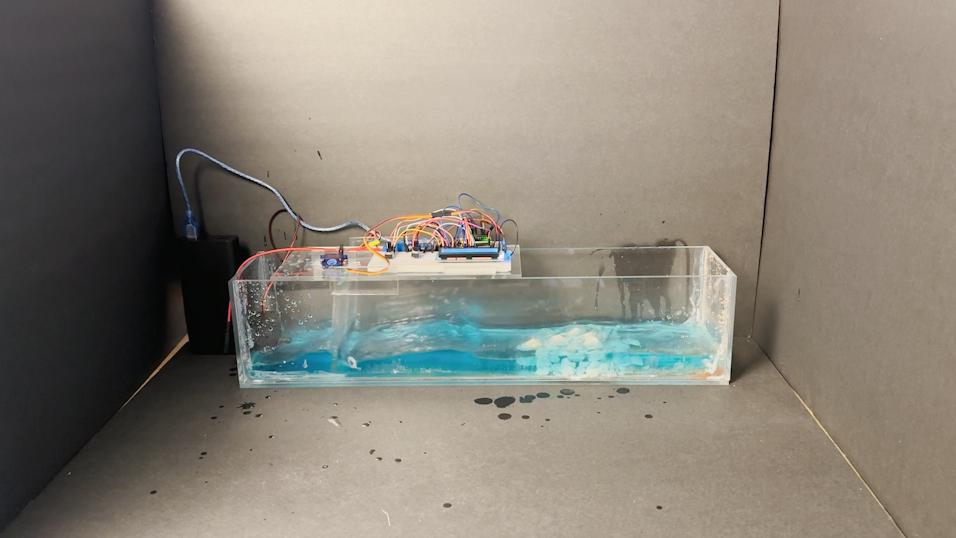
Wave Length: 19.0 ‘
Wave Height: 8.0 ‘ => 9.5 ‘
Generate Frequency: 1.6 times/s
Generator Location: 0.2 (left to right - 0.0 - 1.0)
1. Gravel (small size)
2. => Gravel (large size)
Observation:
Phase 5:
Wave Break Condition: Hard
Phase 6: Object’s Impact on Wave: The increasing water surface covers all the gravel piles. All facade area was used to reflect the wave. The wave peak turns to appear forward.
Basic Information:
Scale: 1:20
Water Volume: 80.35 in3 => 120.21 in3
coloring agent: Blue
Parameters: Testing Object:
Wave Generator: Paddle
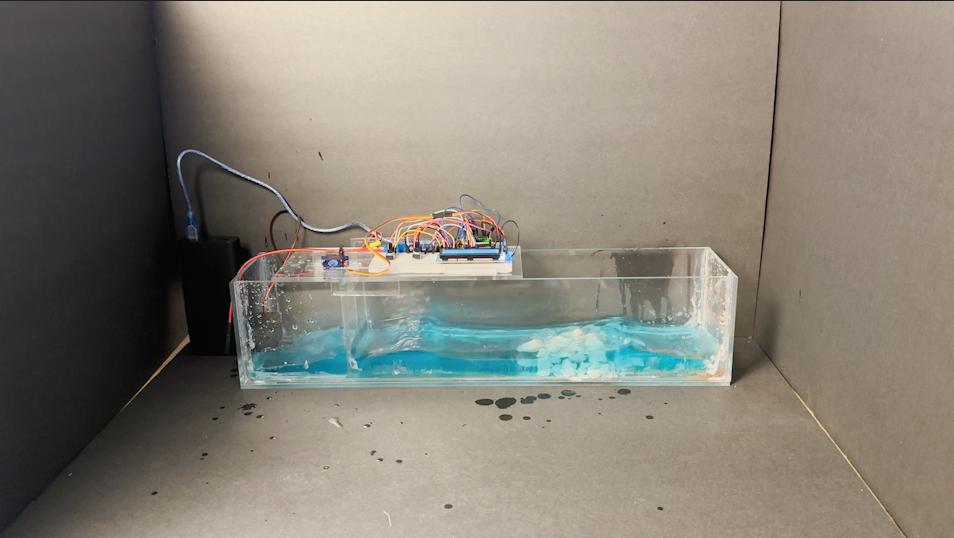
Wave Length: 19.0 ‘
Wave Height: 9.5 ‘ => 8.5 ‘
Generate Frequency: 1.6 times/s
Generator Location: 0.2 (left to right - 0.0 - 1.0)
1. Gravel (small size)
2. Gravel (large size)
Observation:
Phase 5: Wave Break Condition: Hard
Phase 6:
Object’s Impact on Wave: The increasing water surface covers all the gravel piles. All facade area was used to reflect the wave. The wave peak turns to appear forward.
=> Phase 7:
Object’s Impact on Wave: Although the gravel pile highly reduces the wave energy, the face turns to a slope helping the wave to climb. This annotation indicates the comparison of the wave shape before and after the pile.
Basic Information:
Scale: 1:20
Water Volume: 80.35 in3 => 120.21 in3
coloring agent: Blue Observation:
=> Phase 8:
Object’s Impact on Wave: Eliminate the wave energy and keep the water surface behind the pile stable again.
Parameters: Testing Object:
Wave Generator: Paddle

Wave Length: 19.0 ‘
Wave Height: 9.5 ‘ => 8.5 ‘
Generate Frequency: 1.6 times/s
Generator Location: 0.2 (left to right - 0.0 - 1.0)
1. Gravel (small size)
2. Gravel (large size)
3. => Gravel (large size)
Basic Information:
Scale: 1:20
Water Volume: 120.21 in3
coloring agent: Blue
Parameters: Testing Object:
Wave Generator: Paddle
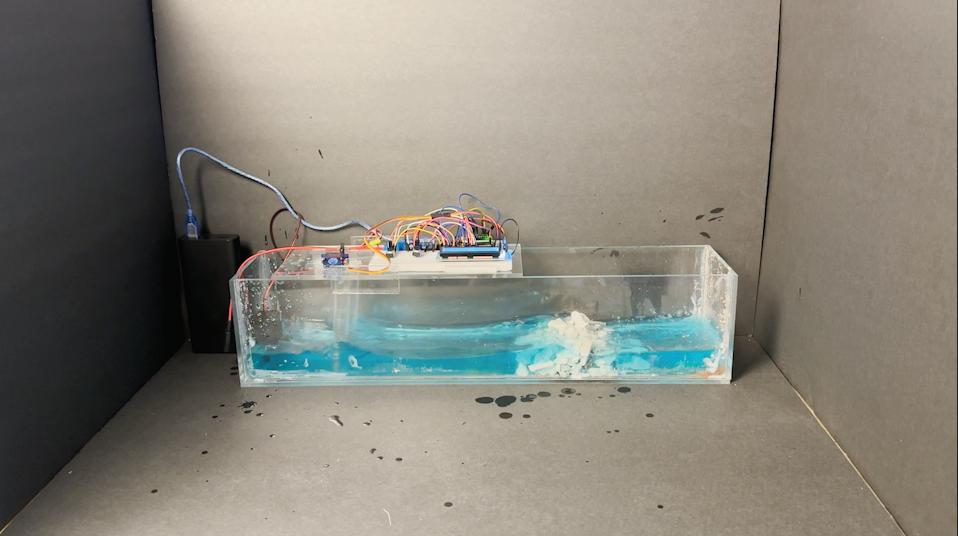
Wave Length: 19.0 ‘
Wave Height: 9.5 ‘ => 8.5 ‘
Generate Frequency: 1.6 times/s
Generator Location: 0.2 (left to right - 0.0 - 1.0)
1. Gravel (small size)
2. Gravel (large size)
3. Gravel (large size)
Observation:
Phase 8:
Object’s Impact on Wave: Eliminate the wave energy and keep the water surface behind the pile stable again.
=>Phase 9:
Object’s Impact on Wave: Different than phase 7, the slope still rises the wave again because of the slope, but the energy left is too small to keep waving again.
Basic Information:
Scale: 1:20
Water Volume: 120.21 in3
coloring agent: Blue
=> Red
Observation:
Phase 8:
Object’s Impact on Wave: Eliminate the wave energy and keep the water surface behind the pile stable again.
Parameters: Testing Object:
Wave Generator: Paddle

Wave Length: 19.0 ‘
Wave Height: 8.5 ‘
Generate Frequency: 1.6 times/s
Generator Location: 0.2 (left to right - 0.0 - 1.0)
1. Gravel (small size)
2. Gravel (large size)
3. Gravel (large size)
=>Phase 9:
Object’s Impact on Wave: Different than phase 7, the slope still rises the wave again because of the slope, but the energy left is too small to keep waving again.
Basic Information:
Scale: 1:20
Water Volume: 120.21 in3
coloring agent: Blue
=> Red
Observation:
Phase 8:
Object’s Impact on Wave: Eliminate the wave energy and keep the water surface behind the pile stable again.
Parameters: Testing Object:
Wave Generator: Paddle
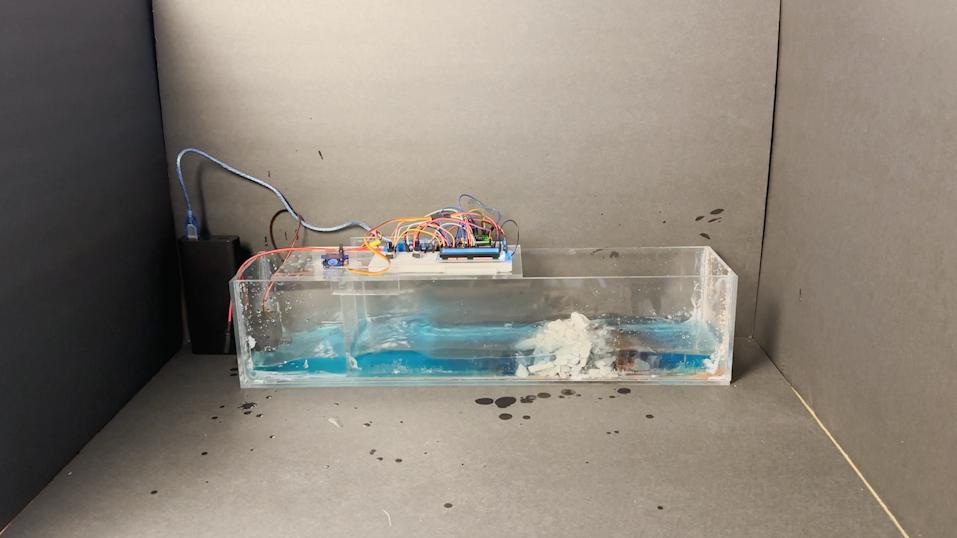
Wave Length: 19.0 ‘
Wave Height: 8.5 ‘
Generate Frequency: 1.6 times/s
Generator Location: 0.2 (left to right - 0.0 - 1.0)
1. Gravel (small size)
2. Gravel (large size)
3. Gravel (large size)
Phase 9: Object’s Impact on Wave: Different than phase 7, the slope still rises the wave again because of the slope, but the energy left is too small to keep waving again.
=>Phase 10:
Object’s Impact on Wave: The red color agent diffuses slowly from the right side to the left side because of the weak energy in the right side area. however, the reflection brings agent to the left size within 1 minute.
Basic Information:
Scale: 1:20
Water Volume: 120.21 in3
coloring agent: Blue Red
Observation:
=> Conclusion:
Object’s Impact on Wave:
Parameters: Testing Object:
Wave Generator: Paddle
Wave Length: 19.0 ‘
Wave Height: 8.5 ‘
Generate Frequency: 1.6 times/s
Generator Location: 0.2 (left to right - 0.0 - 1.0)
1. Gravel (small size)
2. Gravel (large size)
3. Gravel (large size)
This experiment controls most valiables still and only tests how wave responds to gravel. The gravel set-up is shifted in size, layer sequence, height, and shape(slope). Through the experiment, I got a better understanding of how wave reflection occurs and how to use gravel to control waves.
I found several surprising facts. For example, when the gravel’s height is surpassed the mean water surface, it works more effectively than enlarging the gravel size or changing the shape(slope).

